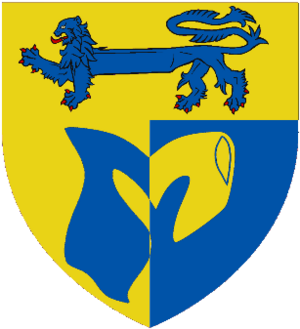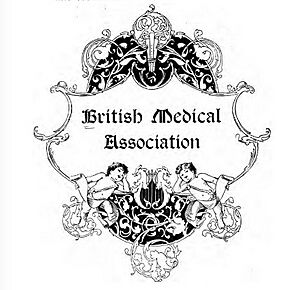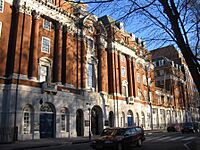British Medical Association facts for kids
 |
|
| Abbreviation | BMA |
|---|---|
| Predecessor | Provincial Medical and Surgical Association |
| Founded | 9 July 1832 |
| Founder | Charles Hastings |
| Headquarters | Tavistock Square, London, England |
|
Region served
|
United Kingdom |
|
Members
|
|
|
Key people
|
|
| Publication | The BMJ |
The British Medical Association, also known as the BMA, is an organization that represents and supports doctors across the United Kingdom. It acts as a trade union, which means it helps protect the rights and interests of doctors at work.
The BMA is not the group that gives doctors their license to practice medicine. That job belongs to the General Medical Council. Instead, the BMA helps negotiate contracts for doctors with employers like the National Health Service (NHS). The BMA's main goal is to support science and medicine, and to look after the medical profession.
Contents
History of the BMA
How It All Began
The BMA started a long time ago, on July 19, 1832. It was founded by a doctor named Sir Charles Hastings and was first called the Provincial Medical and Surgical Association (PMSA). The word "provincial" meant that it was for doctors outside of London.
Ten years later, the group had over 1,300 members and started its own weekly magazine. In 1853, it opened up to doctors in London, and in 1856, it changed its name to the British Medical Association. The magazine also changed its name to the British Medical Journal, which is still published today.
Making Medicine Safer
In the 1800s, anyone could call themselves a doctor, even if they had no training. The BMA helped change this by working on a new law called the Medical Act 1858. This law created the General Medical Council, which made sure that all doctors were properly qualified. This was a huge step in making medicine safer for everyone.
After this, the BMA became a powerful voice for doctors and patients. It campaigned for better public health and safer medical practices.
Creating the National Health Service (NHS)
After the Second World War, the government wanted to create a new healthcare system that would be free for everyone. This system became the National Health Service (NHS) in 1948.
The BMA spent three years talking with the government's Health Minister, Aneurin Bevan. They wanted to make sure that under the new NHS, doctors could still be paid fairly and have some independence in how they worked. Their discussions helped shape how the NHS works with doctors today.
On 7 July 2005, a bomb exploded on a bus near the BMA's main office in London, causing damage to the building. Doctors and staff inside the building rushed out to help the injured people, working with the police and ambulance crews.
What Does the BMA Do Today?
The BMA has over 190,000 members. It is recognized by the government as the main voice for doctors in the UK.
Supporting Doctors at Work
As a trade union, the BMA gives its members advice on their jobs. This includes checking their work contracts, helping with pay issues, and solving problems at the workplace. Members also get the medical journal The BMJ.
Representing All Kinds of Doctors
The BMA has many committees to represent doctors from all branches of medicine. This makes sure every doctor's voice is heard. Some of the main committees are for:
- Consultants – senior hospital doctors.
- General Practitioners (GPs) – family doctors who work in local communities.
- Junior Doctors – doctors who are still in training.
- Medical Students – people studying to become doctors.
- Public Health Doctors – doctors who work to improve the health of the whole community.
Helping with Difficult Decisions
The BMA has a Medical Ethics Committee. "Ethics" is about what is right and wrong. This committee helps doctors think about difficult situations and make the best choices for their patients. For example, they might discuss new medical technologies or patient privacy.
BMA Headquarters
Since 1925, the BMA's main office has been BMA House in Tavistock Square, London. The building was designed by the famous architect Sir Edwin Lutyens. It was officially opened by King George V and Queen Mary.
In the courtyard of BMA House, there is a special memorial. It is a fountain with four statues, built in 1954 to remember the doctors and other healthcare workers who died during the Second World War.
Working for a Fairer World
The BMA believes in "fair and ethical trade." This means they want to make sure that medical supplies, like surgical tools, are made in a way that is fair to the workers who produce them.
The BMA has worked with groups to investigate the conditions in factories in countries like Pakistan, to make sure workers are treated well and work in a safe environment.
Grants and Awards
The BMA gives money, called grants, to doctors for medical research and other projects. This helps to support new discoveries in medicine.
The BMA also gives out awards to honor people who have done amazing work.
- The Medical Book Awards are given every year to the best new books about medicine.
- The Association Medal is for members who have given outstanding service to the BMA.
- The Gold Medal is the highest honor, given to people who have greatly improved the medical profession.
BMA Symbol
 |
|
The BMA's logo features the rod of Asclepius, which is a snake wrapped around a staff. This is an ancient Greek symbol of healing and medicine, named after Asclepius, the Greek god of healing.
The BMA also has a coat of arms with the motto "With Head And Heart And Hand." This represents the knowledge, care, and skill that doctors use in their work.
See also
- World Medical Association
- The Doctors' Association UK
- British International Doctors Association
 | Selma Burke |
 | Pauline Powell Burns |
 | Frederick J. Brown |
 | Robert Blackburn |



